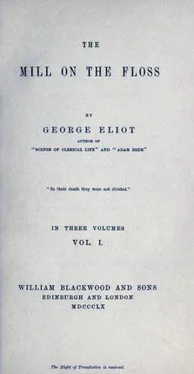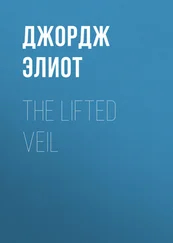"Stand up a moment, Maggie."
"What is your pleasure now?" said Maggie, smiling languidly as she rose from her chair and looked down on her slight, aerial cousin, whose figure was quite subordinate to her faultless drapery of silk and crape.
Lucy kept her contemplative attitude a moment or two in silence, and then said,–
"I can't think what witchery it is in you, Maggie, that makes you look best in shabby clothes; though you really must have a new dress now. But do you know, last night I was trying to fancy you in a handsome, fashionable dress, and do what I would, that old limp merino would come back as the only right thing for you. I wonder if Marie Antoinette looked all the grander when her gown was darned at the elbows. Now, if I were to put anything shabby on, I should be quite unnoticeable. I should be a mere rag."
"Oh, quite," said Maggie, with mock gravity. "You would be liable to be swept out of the room with the cobwebs and carpet-dust, and to find yourself under the grate, like Cinderella. Mayn't I sit down now?"
"Yes, now you may," said Lucy, laughing. Then, with an air of serious reflection, unfastening her large jet brooch, "But you must change brooches, Maggie; that little butterfly looks silly on you."
"But won't that mar the charming effect of my consistent shabbiness?" said Maggie, seating herself submissively, while Lucy knelt again and unfastened the contemptible butterfly. "I wish my mother were of your opinion, for she was fretting last night because this is my best frock. I've been saving my money to pay for some lessons; I shall never get a better situation without more accomplishments."
Maggie gave a little sigh.
"Now, don't put on that sad look again," said Lucy, pinning the large brooch below Maggie's fine throat. "You're forgetting that you've left that dreary schoolroom behind you, and have no little girls' clothes to mend."
"Yes," said Maggie. "It is with me as I used to think it would be with the poor uneasy white bear I saw at the show. I thought he must have got so stupid with the habit of turning backward and forward in that narrow space that he would keep doing it if they set him free. One gets a bad habit of being unhappy."
"But I shall put you under a discipline of pleasure that will make you lose that bad habit," said Lucy, sticking the black butterfly absently in her own collar, while her eyes met Maggie's affectionately.
"You dear, tiny thing," said Maggie, in one of her bursts of loving admiration, "you enjoy other people's happiness so much, I believe you would do without any of your own. I wish I were like you."
"I've never been tried in that way," said Lucy. "I've always been so happy. I don't know whether I could bear much trouble; I never had any but poor mamma's death. You have been tried, Maggie; and I'm sure you feel for other people quite as much as I do."
"No, Lucy," said Maggie, shaking her head slowly, "I don't enjoy their happiness as you do, else I should be more contented. I do feel for them when they are in trouble; I don't think I could ever bear to make any one unhappy; and yet I often hate myself, because I get angry sometimes at the sight of happy people. I think I get worse as I get older, more selfish. That seems very dreadful."
"Now, Maggie!" said Lucy, in a tone of remonstrance, "I don't believe a word of that. It is all a gloomy fancy, just because you are depressed by a dull, wearisome life."
"Well, perhaps it is," said Maggie, resolutely clearing away the clouds from her face with a bright smile, and throwing herself backward in her chair. "Perhaps it comes from the school diet, — watery rice-pudding spiced with Pinnock. Let us hope it will give way before my mother's custards and this charming Geoffrey Crayon."
Maggie took up the "Sketch Book," which lay by her on the table.
"Do I look fit to be seen with this little brooch?" said Lucy, going to survey the effect in the chimney-glass.
"Oh no, Mr. Guest will be obliged to go out of the room again if he sees you in it. Pray make haste and put another on."
Lucy hurried out of the room, but Maggie did not take the opportunity of opening her book; she let it fall on her knees, while her eyes wandered to the window, where she could see the sunshine falling on the rich clumps of spring flowers and on the long hedge of laurels, and beyond, the silvery breadth of the dear old Floss, that at this distance seemed to be sleeping in a morning holiday. The sweet fresh garden-scent came through the open window, and the birds were busy flitting and alighting, gurgling and singing. Yet Maggie's eyes began to fill with tears. The sight of the old scenes had made the rush of memories so painful that even yesterday she had only been able to rejoice in her mother's restored comfort and Tom's brotherly friendliness as we rejoice in good news of friends at a distance, rather than in the presence of a happiness which we share. Memory and imagination urged upon her a sense of privation too keen to let her taste what was offered in the transient present. Her future, she thought, was likely to be worse than her past, for after her years of contented renunciation, she had slipped back into desire and longing; she found joyless days of distasteful occupation harder and harder; she found the image of the intense and varied life she yearned for, and despaired of, becoming more and more importunate. The sound of the opening door roused her, and hastily wiping away her tears, she began to turn over the leaves of her book.
"There is one pleasure, I know, Maggie, that your deepest dismalness will never resist," said Lucy, beginning to speak as soon as she entered the room. "That is music, and I mean you to have quite a riotous feast of it. I mean you to get up your playing again, which used to be so much better than mine, when we were at Laceham."
"You would have laughed to see me playing the little girls' tunes over and over to them, when I took them to practise," said Maggie, "just for the sake of fingering the dear keys again. But I don't know whether I could play anything more difficult now than 'Begone, dull care!'"
"I know what a wild state of joy you used to be in when the glee-men came round," said Lucy, taking up her embroidery; "and we might have all those old glees that you used to love so, if I were certain that you don't feel exactly as Tom does about some things."
"I should have thought there was nothing you might be more certain of," said Maggie, smiling.
"I ought rather to have said, one particular thing. Because if you feel just as he does about that, we shall want our third voice. St. Ogg's is so miserably provided with musical gentlemen. There are really only Stephen and Philip Wakem who have any knowledge of music, so as to be able to sing a part."
Lucy had looked up from her work as she uttered the last sentence, and saw that there was a change in Maggie's face.
"Does it hurt you to hear the name mentioned, Maggie? If it does, I will not speak of him again. I know Tom will not see him if he can avoid it."
"I don't feel at all as Tom does on that subject," said Maggie, rising and going to the window as if she wanted to see more of the landscape. "I've always liked Philip Wakem ever since I was a little girl, and saw him at Lorton. He was so good when Tom hurt his foot."
"Oh, I'm so glad!" said Lucy. "Then you won't mind his coming sometimes, and we can have much more music than we could without him. I'm very fond of poor Philip, only I wish he were not so morbid about his deformity. I suppose it is his deformity that makes him so sad, and sometimes bitter. It is certainly very piteous to see his poor little crooked body and pale face among great, strong people."
"But, Lucy—" said Maggie, trying to arrest the prattling stream.
"Ah, there is the door-bell. That must be Stephen," Lucy went on, not noticing Maggie's faint effort to speak. "One of the things I most admire in Stephen is that he makes a greater friend of Philip than any one."
Читать дальше












